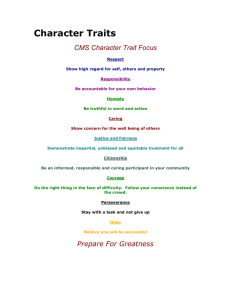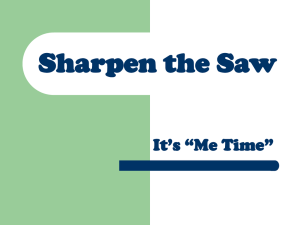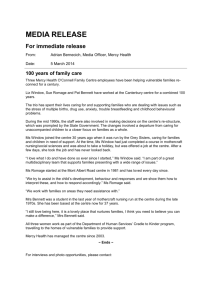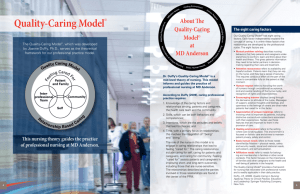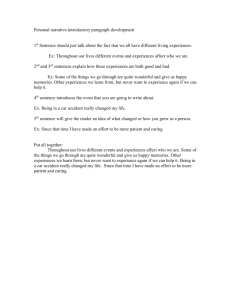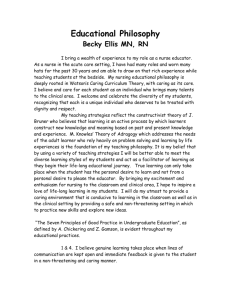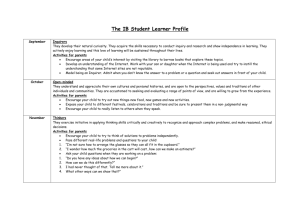Caring - Mercer University
advertisement
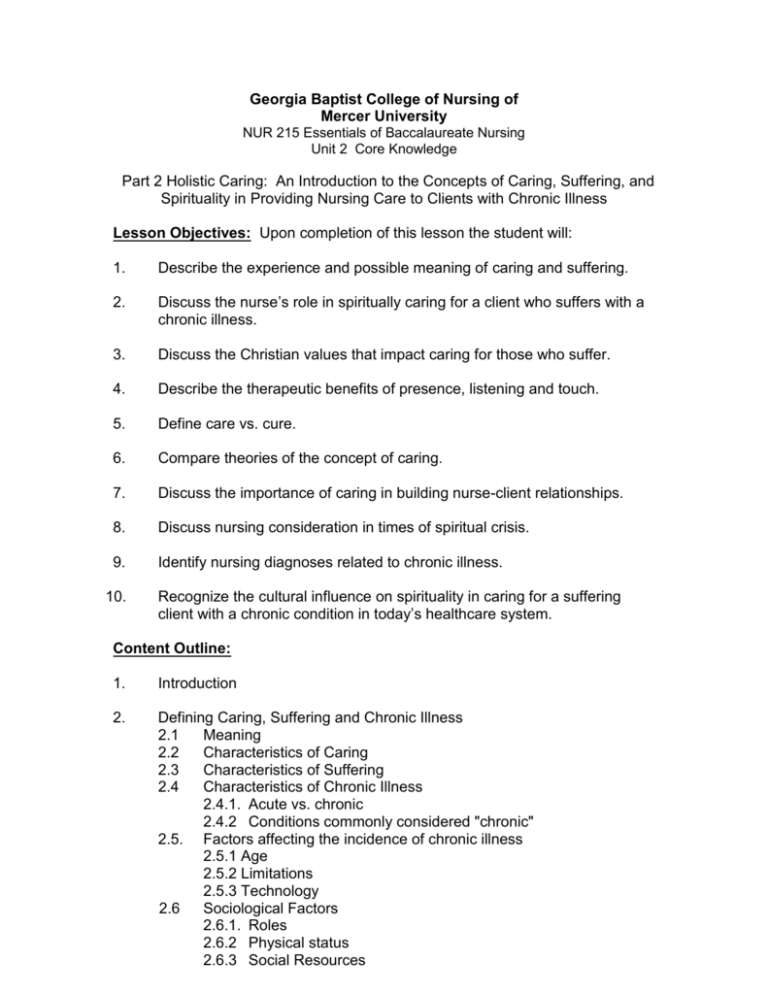
Georgia Baptist College of Nursing of Mercer University NUR 215 Essentials of Baccalaureate Nursing Unit 2 Core Knowledge Part 2 Holistic Caring: An Introduction to the Concepts of Caring, Suffering, and Spirituality in Providing Nursing Care to Clients with Chronic Illness Lesson Objectives: Upon completion of this lesson the student will: 1. Describe the experience and possible meaning of caring and suffering. 2. Discuss the nurse’s role in spiritually caring for a client who suffers with a chronic illness. 3. Discuss the Christian values that impact caring for those who suffer. 4. Describe the therapeutic benefits of presence, listening and touch. 5. Define care vs. cure. 6. Compare theories of the concept of caring. 7. Discuss the importance of caring in building nurse-client relationships. 8. Discuss nursing consideration in times of spiritual crisis. 9. Identify nursing diagnoses related to chronic illness. 10. Recognize the cultural influence on spirituality in caring for a suffering client with a chronic condition in today’s healthcare system. Content Outline: 1. Introduction 2. Defining Caring, Suffering and Chronic Illness 2.1 Meaning 2.2 Characteristics of Caring 2.3 Characteristics of Suffering 2.4 Characteristics of Chronic Illness 2.4.1. Acute vs. chronic 2.4.2 Conditions commonly considered "chronic" 2.5. Factors affecting the incidence of chronic illness 2.5.1 Age 2.5.2 Limitations 2.5.3 Technology 2.6 Sociological Factors 2.6.1. Roles 2.6.2 Physical status 2.6.3 Social Resources 3. 4. Caring in response to suffering 3.1 Christian caring 3.2 Care and cure 3.3 Characteristics of caring 3.6 Factors affecting caring behaviors 3.7 Concepts confused with caring Nurse’s role in caring for those who suffer with a chronic illness 4.1. Independence or dependence 4.2. Care givers 4.3. Technology 4.4. Developmental level 4.5. Resources 5. Nursing considerations in times of spiritual crisis 5.1. Giving birth 5.1.1. Infant baptism 5.1.2. Circumcision 5.2. Medical procedures which may be influenced by religious beliefs 5.2.1. Abortion 5.2.2. Amputation 5.2.3. Blood transfusion 5.3. Being unable to participate in religious observations 5.4. Facing death 6. Nursing Diagnoses 6.1. Altered Health Maintenance 6.2. Powerlessness 6.3 Alteration in parenting 6.4 Ineffective coping 6.5 Impaired adjustment 6.6 Body image disturbance 6.7 Ineffective role performance 6.8 Chronic or situational low self-esteem 7. Religion, health, and illness 7.1. Overview of specific religious practices that impact healthcare 7.2. Nursing considerations Teaching/Learning Activities: 1. 2. 3. Small group discussion in class Class discussion Didactic presentation Critical Thinking Focus: 1. Formulate your own personal understanding of what suffering may mean to a client. 2. Conceptualize a nursing procedure setting that would maximize the nurse’s ability to care for a suffering client. 3. Review case scenarios which entail nursing consideration of clients' spiritual needs for a client with a chronic illness. 4. Discuss the relationship of physiological fatigue, depression, and hope as may occur for clients and caregivers dealing with chronic conditions. Required Reading: Potter, P.A. & Perry, A.G. (2005). Fundamentals of nursing. (6th ed.) (pp.100-103; 107-115; 544-566). St. Louis: Mosby. Suggested Resources: Benner, P., & Wrubel, J. (1989). The primacy of caring, Menlo Park, CA: Addison-Wesley. Bevis, E. (1981). Caring: A life force. In M. Leininger (Ed.) Caring: An essential human need. (pp. 46-57) Thorofare, NJ: Charles B. Slack. Yancy, P. (1990). Where are you God when it hurts? Grand Rapids, MI: Zondervan. Burks, K. J. (1999). A nursing practice model for chronic illness. Rehabilitation Nursing, 24(5), 197-200. Web site for International Association of Human Caring: www.lasalle.edu/academ/grad/nusing/iahc Web site for suffering topics: www.probe.org/docs/suffering.html 9/2006 JDJ Caring, Suffering, Spirituality in Chronic Illness
